Diplomatic Bluebook 2022
Chapter 3
Japan Strengthening Its Presence in the International Community
3 Science and Technology Diplomacy
Science and technology constitute the foundational elements for peace and prosperity that support socioeconomic development, and play a vital role in ensuring safety and security. By harnessing its own advanced science and technology, Japan promotes Science and Technology Diplomacy, thereby contributing to the development of science and technology at home and abroad, the promotion of relations with other countries, the peace and stability of the international community, and the resolution of global challenges. As part of this effort, Japan places emphasis on initiatives implemented through the activities of the Science and Technology Advisor to the Minister for Foreign Affairs.
In September 2015, MOFA established the post of Science and Technology Advisor to the Minister for Foreign Affairs, and appointed Prof. Kishi Teruo, Professor Emeritus of the University of Tokyo, as the first Science and Technology Advisor. Following the end of his term, Prof. Kishi was replaced by Prof. Matsumoto Yoichiro, Professor Emeritus of the University of Tokyo as the new advisor in April. Moreover, since April 2019, Prof. Kano Mitsunobu has assumed the post of the Science and Technology Co-Advisor to the Minister for Foreign Affairs to support the work of the Science and Technology Advisor. Prof. Matsumoto supports the activities of the Foreign Minister from the perspective of science and technology, and provides advice on the utilization of science, technology and innovation (STI) in the planning and coordination of various foreign policies to the Minister and relevant divisions.
In 2021, meetings of the Advisory Board for Promoting Science and Technology Diplomacy, chaired by Prof. Matsumoto were held in January and July. In the July meeting, recommendations for the Food Systems Summit (held from September 23 to September 25) and the Tokyo Nutrition for Growth Summit 2021 (held on December 7 and 8) as well as the STI Showcase on food systems transformation and nutrition improvement were summarized, which were submitted to State Minister for Foreign Affairs Washio by Prof. Matsumoto and Prof. Kano in September.
Prof. Matsumoto and Prof. Kano endeavor to exchange views with other countries' government science and technology advisors, such as the U.S., UK, and New Zealand in developing and strengthening a network. Online meetings of the Foreign Ministries Science and Technology Advisors Network (FMSTAN) were held, in which in-depth discussion was conducted, including response to COVID-19. On the occasion of the Tokyo Nutrition for Growth Summit 2021 held in December, Japan took the lead with like-minded international Science and Technology Advisors in releasing a joint statement on “Promoting Global Utilization of Science, Technology and Innovation for Food Systems Transformation to Ensure the Health of People and the Planet (STEPP)” in enhancing cooperation.
At the 24th Session of the Commission on Science and Technology for Development (CSTD) held in May, Prof. Matsumoto emphasized the importance of conducting research and development in non-medical fields including technologies of deactivating viruses through Deep-UV LEDs as a role of STI against the COVID-19 pandemic. Furthermore, at the 2021 OSCE Asian Conference held in September, Prof. Matsumoto introduced Japan's efforts and examples including activities on disaster prevention and environmental protection utilizing satellite data by JAXA, and joint research programs between Japan and developing countries called SATREPS that aim to find solutions to global issues.
Furthermore, Prof. Matsumoto regularly hosts science and technology diplomacy seminars to raise the level of knowledge within MOFA.
Japan has concluded 32 science and technology cooperation agreements, and these are now in force with 46 countries and the EU.9 Based on these agreements, regular joint committee meetings are organized with these countries to engage in intergovernmental dialogue. In 2021, joint committee meetings were held with the U.S., Spain, the UK, Norway, and the EU, respectively. Attended by delegates from the relevant ministries and agencies, consultations were held on the current status of cooperation in diverse sectors, and on the future direction of cooperation.
With regard to multilateral cooperation, as a member of the Board of the International Science and Technology Center (ISTC), which was established to support research for peaceful purposes conducted by researchers on weapons of mass destruction from the former Soviet Union, and now involved in a wide range of research and development such as chemistry, biology, radioactive materials and nuclear power, Japan works to provide support mainly to countries of Central Asia. Japan also participates in the ITER project to demonstrate the scientific and technological feasibility of nuclear fusion energy.
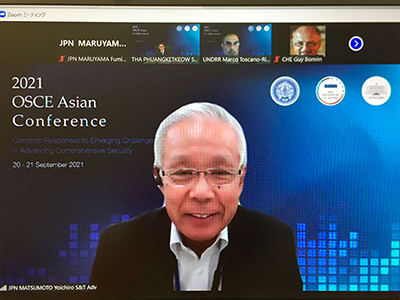 Prof. Matsumoto, Science and Technology Advisor to the Minister for Foreign Affairs, participated in the panel discussion at the 2021 OSCE Asian Conference (September, Tokyo)
Prof. Matsumoto, Science and Technology Advisor to the Minister for Foreign Affairs, participated in the panel discussion at the 2021 OSCE Asian Conference (September, Tokyo)- 9 For the breakdown, see the Ministry of Foreign Affairs website: https://www.mofa.go.jp/mofaj/gaiko/technology/nikoku/framework.html

Currently, the number of refugees and internally displaced persons has risen to the highest level since World War II, to approximately 82.4 million, and the humanitarian crisis that is arising as a result of conflicts and natural disasters is becoming increasingly complex and prolonged. Moreover, the spread of COVID-19 has further exacerbated the difficulty of providing humanitarian aid. Under such circumstances, Japan, in cooperation with international organizations, has been providing efficient and sustainable assistance to meet the growing needs for humanitarian aid.
■Continued support for the health of displaced persons and local residents
– Supporting displaced persons in Bangladesh
Sugawara Naoko, Health Officer, International Federation of Red Cross and Red Crescent Societies (IFRC), Bangladesh Country Office
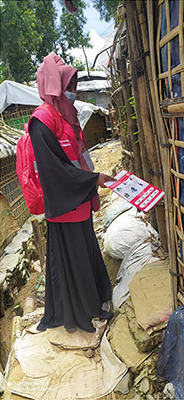 Door-to-door visits by health volunteers (July. Photo: Bangladesh Red Crescent Society)
Door-to-door visits by health volunteers (July. Photo: Bangladesh Red Crescent Society)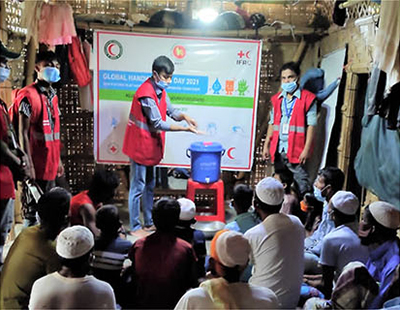 Activities for the Global Handwashing Day campaign (October. Photo: Bangladesh Red Crescent Society)
Activities for the Global Handwashing Day campaign (October. Photo: Bangladesh Red Crescent Society)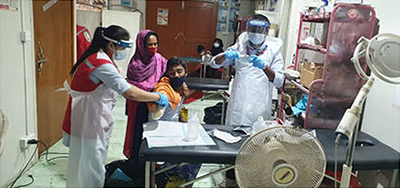 Emergency outpatient service at a Bangladesh Red Crescent Society field hospital (September. Photo: Bangladesh Red Crescent Society)
Emergency outpatient service at a Bangladesh Red Crescent Society field hospital (September. Photo: Bangladesh Red Crescent Society)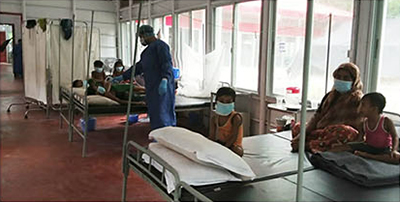 Hospital ward of the COVID-19 isolation and treatment center (July. Photo: Bangladesh Red Crescent Society)
Hospital ward of the COVID-19 isolation and treatment center (July. Photo: Bangladesh Red Crescent Society)August 2021 marks four years since the mass influx of displaced persons from Myanmar's Rakhine State into neighboring Bangladesh reached its peak in August 2017. Today, the number of displaced persons exceeds 900,000 (of whom 51% are children), and they continue to have to depend on assistance for most aspects of their lives. This is putting pressure on the lives of the local residents in Bangladesh where poverty rates are high.
The IFRC, along with the International Committee of the Red Cross and the Red Cross and Red Crescent Societies of 11 countries around the world including Japan, is providing various forms of support to 34 camps for displaced persons as well as to local residents through the Bangladesh Red Crescent Society (BDRCS). This support includes ensuring the hygiene of water supplies, provision of shelter, and health and medical care.
Among these, with regard to support for health and medical care, five Red Cross and Red Crescent Societies, including IFRC, are providing assistance to establish and operate 14 BDRCS health and medical facilities at 13 camps for displaced persons. In addition, they have also been engaging in activities to promote health and hygiene, and to train health volunteers among displaced persons and local residents who have undergone training in maternal and child health, infectious disease response, nutrition, first-aid, and psychological first aid. Through cooperation between the health and medical facilities and health volunteers, they are contributing to disease prevention as well as early detection and treatment. Furthermore, IFRC is also providing support to BDRCS in responding to the COVID-19 pandemic by setting up a COVID-19 isolation and treatment center equipped with 50 beds. Health volunteers serve as a bridge between the displaced persons and the health and medical facilities by visiting each household they are in charge of in the camp and conveying accurate information, thereby ensuring that residents with COVID-19 symptoms undergo testing and receive treatment.
Although the issue of displaced persons is becoming a protracted problem with no solutions in sight, global interest in the issue is fading and it is becoming increasingly difficult to secure funding. Regardless of this, IFRC is providing support to BDRCS with other Red Cross and Red Crescent Societies in establishing one new in-camp health and medical facility and two facilities in areas where local residents live, and expanding the regions where health volunteers conduct activities. Through these efforts, IFRC will continue to support health and medical needs within and outside camps for displaced persons in the future.
■Support activities to protect people from the COVID-19 pandemic and the adverse impact of climate change
Tsumura Yasuhiro, World Food Programme (WFP)(Note) Representative and Country Director in the Republic of The Gambia
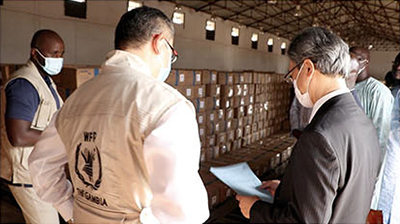 The author (left) guiding the Ambassador of Japan to Senegal around the WFP warehouse (Photo: WFP)
The author (left) guiding the Ambassador of Japan to Senegal around the WFP warehouse (Photo: WFP)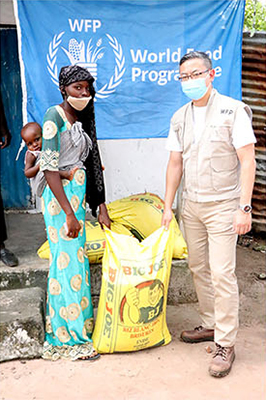 A storm victim who has received emergency food rations, and the author (right) (Photo: WFP)
A storm victim who has received emergency food rations, and the author (right) (Photo: WFP)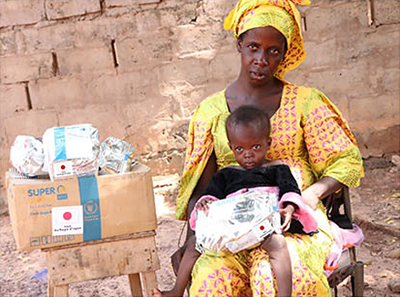 A mother and child who have received support to improve nutrition, through Japan's ODA contribution (Photo: WFP)
A mother and child who have received support to improve nutrition, through Japan's ODA contribution (Photo: WFP)In the Republic of The Gambia, located on the western end of the African Continent, poverty and food security have been exacerbated since COVID-19 reached its shores in March 2020, due to restrictions imposed on social and economic activities to contain the virus, and the stagnation of domestic and foreign logistics activities. Furthermore, the prohibition of travel into the country from Europe has greatly impacted the lives of those working in the tourism industry, which makes up 20% of The Gambia's gross national product (GNP), and of those engaged in other industries that are reliant on the tourism industry. Adding to these problems, the prices of main food products rose further year-on-year in 2021.
The Gambia is also experiencing a growing incidence of various adverse effects of climate change every year. In addition to an increasing number of disasters in recent years such as fires, storms, and droughts accompanying temperature rise and decline in rainfall, such disasters are also growing in scale. As much of the country's territory is on lowlands along The Gambia River and there is very little difference in elevation, the land becomes inundated by salt water for more than 200 km up from the estuary, causing extensive salt damage to well water, cultivated fields, and crops. This situation not only leads to a decline in agricultural productivity, but also results in an outflow of people from farming villages and social instability due to conflicts over water and land. In 2021, a storm with a level of intensity not seen in recent years swept across a large part of The Gambia, and many of the people who had already experienced social and economic losses from the COVID-19 pandemic saw their houses destroyed and suffered crop and livestock losses.
Under these circumstances, a survey on the food situation and vulnerability conducted in 2021 revealed that The Gambia is going through its worst food situation in the past 10 years, based on the results of the same survey conducted in 2011, 2016, 2021.
In view of this situation, in the first half of 2021, the World Food Programme (WFP) provided food assistance to approximately 340,000 people living in a serious state of poverty. In the event of storms, which occur during the rainy season, the WFP acted as the leader of the UN Disaster Management Team to coordinate support activities undertaken by various UN organizations, while cooperating and collaborating with the government's disaster management agency to distribute food and cash to 31,000 disaster victims. Furthermore, thanks to the FY2020 supplementary budget contribution from the Government of Japan, we were able to provide support for improving nutrition for 40,000 of the most vulnerable and malnourished expectant mothers and young children.
The WFP not only offers swift humanitarian assistance, but also provides support to strengthen resilience and sustainability at the community, municipal, and national levels for addressing disaster risks arising from climate change. Some examples of such support include building dams and waterways to prevent salt damage, supporting farming groups to prevent the loss of harvested food and secure sales channels, and developing disaster readiness plans and early warning systems within municipal governments and disaster management agencies.
- (Note) WFP: United Nations World Food Programme
The COVID-19 pandemic left marked changes on our lifestyles, but no change is in sight about the crisis of environmental degradation. Although movement restrictions during the lockdowns led to some recoveries in the natural ecosystem, other positive signs on the environment, such as reduction in air pollutants such as PM2.5, were short-lived. Meanwhile, some progress made prior to the COVID-19 pandemic on issues, such as waste management and plastic pollution reduction, suffered a setback during the pandemic, making it a challenging period for us who are in the field of environmental protection.
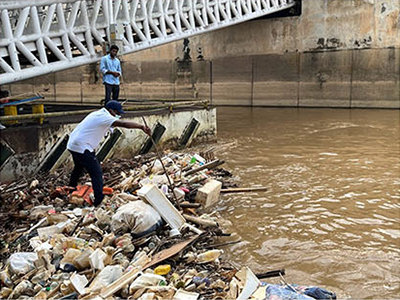 Large quantities of waste, including plastics, reaching the Mekong River basin (in the northern part of Thailand)
Large quantities of waste, including plastics, reaching the Mekong River basin (in the northern part of Thailand)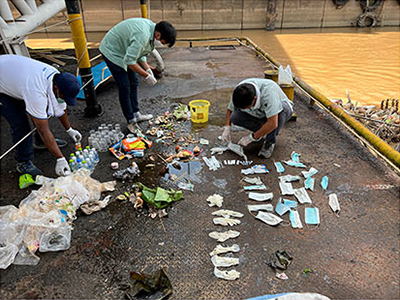 Since 2020, there has been a dramatic increase in the quantity of waste believed to have been used in the fight against COVID-19
Since 2020, there has been a dramatic increase in the quantity of waste believed to have been used in the fight against COVID-19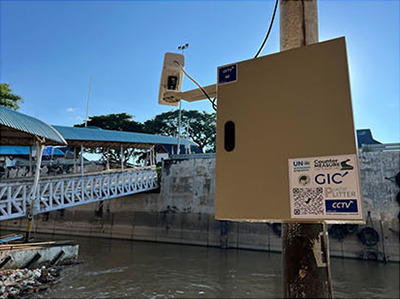 CCTV camera installed with Japan's assistance and the cooperation of the local government. Images are analyzed using artificial intelligence (AI).
CCTV camera installed with Japan's assistance and the cooperation of the local government. Images are analyzed using artificial intelligence (AI).For the past 20 years, I have worked on environmental assessment and pollution control in Asia and the Pacific and Latin America and the Caribbean as part of the United Nations Environment Programme (UNEP). UNEP is the UN organization that sets the global environmental agenda, provides support for policymakers, and serves as an authoritative advocate for the conservation of the global environment. As the “global environment authority,” UNEP also promotes environmental measures within the UN system.
According to UNEP, Asia has nine of the ten countries that top the ranking for plastic pollution, along with 43 of the 50 rivers with the highest estimated plastic waste discharge. Although plastic pollution has captured public attention as a household but global issue, few are aware about the causes of the problem, with some voicing skepticism about the effectiveness of the measures being proposed. Due to widespread perceptions that plastic pollution was a subset of marine pollution, networking among experts and information exchange to counter plastic leakage through rivers had been quite limited until recently. With the support of the Government of Japan, UNEP is implementing a project (CounterMEASURE II project(Note1)) that seeks to monitor/analyze the volume and types of plastics flowing into the rivers via images using artificial intelligence (AI), in collaboration with Google and other partners such as the Asian Institute of Technology. According to a survey conducted in the Mekong River basin in November, large quantities of products related to COVID-19 were found(Note2), including disposable masks, gloves, and rapid used test kits. This latest information from Japanese partner organizations and experts from other parts of Asia has helped inform the Government of India's drafting of the Plastic Waste Management Amendment Rules (amended in August 2021)(Note3) as well as the Regulations on the Long-term and Cost-Effective Monitoring of Plastic Waste of the Mekong River Commission.
On combatting air pollution in Asia, a science and policy dialogue and a ceremony were held to commemorate the 20th anniversary of the establishment of the Acid Deposition Monitoring Network in East Asia (EANET), an intergovernmental initiative supported by UNEP and countries including Japan. At the Twenty-third Session of the Intergovernmental Meeting (IG23) convened in November, EANET's operating regulations (Annex) in its Instrument were amended, with a view to expanding the scope of cooperation on air pollution.(Note4) Air pollution, among all pollution types, causes the greatest and most direct damage to human health, particularly for children. On the International Day of Clean Air for blue skies (September 7), UNEP called on each country to take further actions to protect our rights to clean air.(Note5)
The core of UNEP's Medium Term Strategy (2022–2025) is to tackle the three planetary crises of climate change, biodiversity loss, and pollution. To avoid a global environmental catastrophe, there is no other way than for all households, and all regions - including developing countries - to work together in their own capacities to achieve the SDGs and to build financial and investment incentive systems to reduce pressures on the environment, prompting transformative changes in the economy and society. To ensure that “no one is left behind,” we are all pressed to contribute to the implementation of multilateral environmental agreements (MEAs), while reflecting the views of youth and strengthening the use of digital technologies.
- Note1 Official project website: https://countermeasure.asia (English only)

- Note2 See below for details on surveys conducted using monitoring cameras https://countermeasure.asia/tackling-the-plastic-pandemic-by-closed-circuit-television-monitoring/(English only)

- Note3 Announcement of the amendment on the Government of India's official website: https://pib.gov.in/PressReleaseIframePage.aspx?PRID=1745433 (English and local languages only)

- Note4 Official website of the network: https://www.eanet.asia/ (English only)

- Note5 Official event website: https://cleanairweek.org/ (English only)

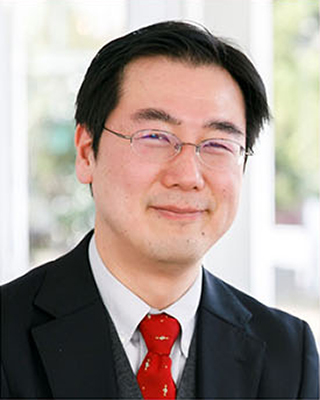 The author
The author(Photo: Okayama University)
After being appointed as Science and Technology Co-Advisor to the Minister for Foreign Affairs in 2019, I have been advising on diplomacy activities alongside Professor Matsumoto Yoichiro, Science and Technology Advisor to the Minister for Foreign Affairs and members of the Advisory Board for Promoting Science and Technology Diplomacy.
We are currently confronted by various global issues, such as hunger and malnutrition, climate change, and the deterioration of the environment. These problems cannot be resolved by any one country alone; instead, the world needs to work as one to address the issues. In 2021, despite the COVID-19 pandemic, the 26th session of the Conference of the Parties to the United Nations Framework Convention on Climate Change (COP26), UN Food Systems Summit, and Tokyo Nutrition for Growth Summit 2021 were convened, highlighting the urgent nature of these issues.
In September, the Advisory Board for Promoting Science and Technology Diplomacy submitted to the Ministry of Foreign Affairs its recommendations on the utilization of science, technology and innovation (STI) to contribute to improving hunger and malnutrition as well as to food systems transformation that pays good attention to the Earth's natural systems. These recommendations were presented in a document titled “STEP Initiative by STI” (Systems Transformation to Ensure Planetary health). The Advisory Board has also compiled an STI showcase (collection of case studies) that feature the strengths of Japan's STI.
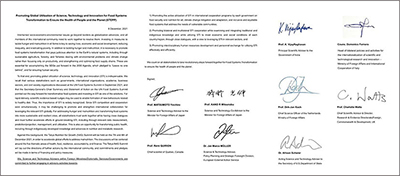 Joint Statement on Promoting Global Utilization of Science, Technology and Innovation for Food Systems Transformation to Ensure the Health of People and the Planet (STEPP)
Joint Statement on Promoting Global Utilization of Science, Technology and Innovation for Food Systems Transformation to Ensure the Health of People and the Planet (STEPP)The utilization of STI proposed in the STEP recommendations should be promoted on a global scale. In December, based on the recommendations, Professor Matsumoto and I presented a joint statement, “Promoting Global Utilization of Science, Technology and Innovation for Food Systems Transformation to Ensure the Health of People and the Planet” (STEPP), along with science and technology advisors from various countries and regions on the occasion of the Tokyo Nutrition for Growth Summit 2021. This joint statement sets out the following scientific advice activities to be carried out by foreign ministries and diplomatic agencies as well as governmental science and technology advisors from countries and regions around the world, taking the opportunity of the Tokyo Nutrition for Growth Summit 2021: (1) Promoting the active utilization of STI in international cooperation programs by each government on food security and nutrition for all, climate change mitigation and adaptation, and inclusive and equitable food systems that address the needs of vulnerable communities; (2) Promoting bilateral and multilateral STI cooperation while examining and integrating traditional and indigenous knowledge and while utilizing STI to meet economic and social conditions of each country/region, through close dialogues, with a view to leveraging STI in relevant sectors; and (3) Promoting interdisciplinary human resources development and personnel exchange for utilizing STI effectively and efficiently. It also sets out the expectation for all stakeholders to take steps forward together for food systems transformation to ensure the health of people and the planet.
Going forward, there is a need for each country to put these recommendations into practice in concrete projects. It is our hope that our recommendations and joint statement will be beneficial for advancing international cooperation.
- (Note) STI: Science, Technology and Innovation



